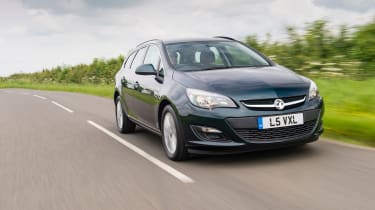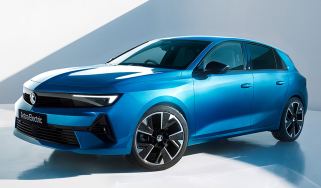Vauxhall Astra Sports Tourer estate (2010-2016) - MPG, running costs & CO2
The Vauxhall Astra Sports Tourer sits in competitive insurance groups, although fuel economy and residual values are bettered by key rivals
In isolation, the Vauxhall Astra Sports Tourer looks like a very sound long-term investment. Most of the engines have fairly good fuel consumption figures and its competitive insurance groups and servicing costs mean it shouldn’t be too expensive to maintain.
Cross-reference the Vauxhall Astra estate with its main rivals, however, and things start to look less impressive. While the engines are generally quite fuel-efficient, they’re not quite the most efficient in the class. For example, even the least frugal petrol engine in a Volkswagen Golf estate returns better fuel economy than the most efficient petrol in the Astra Sports Tourer.
Despite Vauxhall’s attempts to push the Astra more upmarket, residual values are also not the best you’ll find in this class (for that you’ll need the aforementioned Volkswagen). However, the Sports Tourer’s used values are expected to be similar to those you can expect from more mainstream rivals, such as the Peugeot 308 SW.
Vauxhall Astra Sports Tourer MPG & CO2
For the best possible fuel economy, buyers should consider the 1.6-litre diesel engines, as they’re comfortably the most frugal on offer. All can return well over 60mpg, with the most efficient of all being the 108bhp version that’s capable of up to 74mpg. The ultra-low CO2 emissions of these 1.6-litre diesels also gives them the most affordable road-tax rates in the Vauxhall Astra Sports Tourer range, with the 108bhp engine’s sub-100g/km figure making it exempt from road tax entirely.
Although the other engines aren’t quite as affordable to run, their decent fuel economy and CO2 emissions figures mean they shouldn’t be too hard on your wallet. Even the most powerful engine in the range (the 192bhp BiTurbo) can return 55mpg.
More reviews
In-depth reviews
- Vauxhall Astra review - striking hatchback with updated tech
- Vauxhall Astra Sports Tourer review - versatile family estate
- Vauxhall Astra Electric review - household name with an EV twist
- Vauxhall Astra hatchback review (2015-2021)
- Vauxhall Astra Sports Tourer estate (2016-2021)
Used car reviews
Unless you really don’t want to a diesel engine, we’d advise against the 1.4 and 1.6-litre petrols. Not only are they more expensive than the diesels to run, but they’re also outclassed by petrol engines in the Vauxhall Astra Sports Tourer’s key rivals. For instance, while Vauxhall’s 1.4-litre petrol returns a respectable 48mpg, it falters in comparison with the 53mpg that the Volkswagen Golf estate can achieve with an identically sized engine.
Insurance group
Like many cars of this size, the Vauxhall Astra Sports Tourer falls into a broad range of insurance groups depending on what engine and trim level you go for. The cheapest version to insure is the 1.4-litre petrol model in entry-level Design trim (group 9), with the most expensive being the BiTurbo (group 28).
Interestingly, fitting an automatic gearbox doesn’t affect your insurance group – the 2.0-litre diesel, for instance, is a group 20 car, regardless of which transmission you choose. In comparison, the Peugeot 308 SW sits in group 24 with a manual gearbox and group 25 with an automatic.
On the whole, the Vauxhall Astra Sports Tourer sits in similar insurance groups to its main competitors. However, some versions of the VW Golf estate, Ford Focus estate and SEAT Leon ST fall into lower groups than the equivalent Astra estate.
Warranty
Vauxhall’s warranty is pretty much standard fare for this type of car. With a limit of three years or 60,000 miles, whichever’s reached first, the Astra Sports Tourer has the same amount of after-sales cover as most of its rivals. Some competitors come with far more impressive warranties, though: the Hyundai i30 Tourer, for instance, gets a five-year, unlimited-mileage warranty.
Servicing
Servicing intervals are well spaced out for the Astra Sports Tourer, with Vauxhall recommending the car be looked at once every 20,000 miles. This puts it on par with rivals like the Kia Cee’d SW and is better than the Volkswagen Golf estate’s recommended service interval of 10,000 miles.
Vauxhall’s servicing costs are also fairly competitive. As with most other Vauxhalls currently on sale, the Astra Sports Tourer is eligible for a fixed-cost maintenance plan. How much you pay for this plan will depend on your annual mileage, the length of the plan and which dealership you purchased it from.














